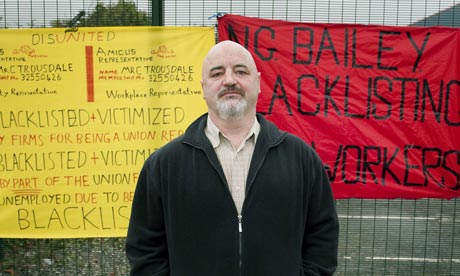Construction union UCATT has said it is “bitterly disappointed” with the new blacklisting regulations, warning the measures are so weak that they will not prevent blacklisting from occurring.
Employment relations minister Lord Young announced the new measures, which came into effect on 2 March. He said: “Blacklisting someone because they are a member of a trade union is underhand, unfair and blights people’s lives.
“The new regulations outlaw the compilation, dissemination and use of blacklists. They have been designed to build on existing protections in the area, which are found in trade union and data protection law, Good employers who operate fair and open vetting processes have nothing to fear from these regulations.” He added: “I am confident that this new piece of legislation will bring to an end the disreputable practice of blacklisting once and for all.”
The regulations:
* make it unlawful for organisations to refuse employment or sack individuals as a result of appearing on a blacklist;
* make it unlawful for employment agencies to refuse to provide a service on the basis of an individual appearing on a blacklist; and
* enable individuals or unions to pursue compensation or solicit action against those who compile, distribute or use blacklists.
However, Alan Ritchie, general secretary of UCATT, said these measures were insufficient, and said the government had ignored its call for the regulations to be beefed up. “Fortunately for Lord Young blacklisting doesn’t occur in the House of Lords but ordinary construction workers are not so privileged,” he said.
UCATT argued that the regulations were deficient because they did not make blacklisting a specific criminal offence and only prevented workers from being blacklisted for undertaking, the narrowly defined, “trade union activities”.
The union adds that the regulations also fail to grant an automatic right to compensation for any worker who discovers that they have been blacklisted. If a blacklist is discovered workers will not be automatically told that they had been blacklisted.
Mr Ritchie said: “Cynical construction employers will recognise the weakness of the regulations and could continue to blacklist workers. They know that they are unlikely to get caught and if they do they will merely get a slap on the wrist. UCATT will continue to campaign to have the regulations overhauled so that they are truly effective in stamping out this despicable practice once and for all.”
In March 2009, the Information Commissioner reported that 40 construction companies had subscribed to a database used to vet construction workers, which has now been closed under data protection law. On 16 July last year, Ian Kerr, a former Special Branch officer and the individual who operated the database, was fined £5,000 at Knutsford Crown Court for committing a criminal offence under data protection law.
